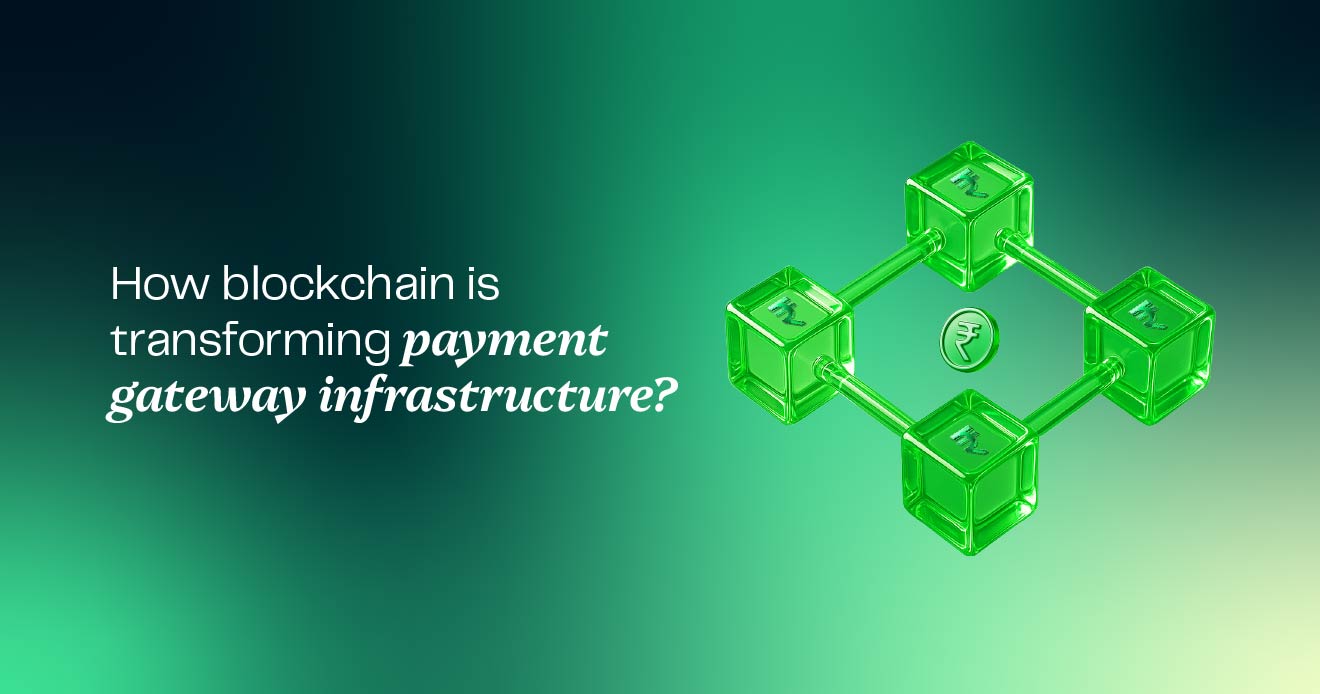“The blockchain does one thing: It replaces third-party trust with mathematical proof that something happened.” – Adam Draper
Blockchain is a term typically associated with cryptocurrency, but has moved beyond that sphere today and found more applications. In the payments industry, blockchain is now being used to secure transactions with immutability.
Blockchain payment gateways have the potential to transform the transaction landscape at a fundamental level. This guide will cover blockchain as a payment gateway technology, its benefits, use cases, and how businesses can start adopting it. Let’s get started.
What is a payment gateway?
A payment gateway technology is a service that businesses use to accept and initiate digital payments online or in physical stores. You can think of it as a secure bridge that connects a business, a bank, and the payer through a secure channel.
Digital payments routed through payment gateways follow the path shown below:
Customer -> Business website -> Gateway -> Bank/Payment processor -> Confirmation of payment.
Payment gateways are the cornerstone for e-commerce businesses because they enhance customer experience by providing smooth and intuitive checkouts.
For subscription services, payment gateways enable secure and reliable processing of recurring payments. Even in the digital services niche, payment gateways offer convenient online transactions that help businesses accept payments from customers anywhere on the globe.
What is blockchain technology?
Blockchain is a decentralised, digital record used to track digital transactions across a network. The distributed ledger mechanism makes the blockchain payment gateway an immutable entity with transparent data records, making it difficult to tamper with and enhancing transaction security.
Blockchains have three key components that help them record and verify transactions:
• P2P network to allow multiple nodes to participate.
• Smart contracts (self-executing digital contracts).
• Consensus mechanism, which is a verification standard that signatory parties must agree to.
These components work in tandem to ensure that the payment system remains transparent and secure. There are two types of blockchains:
• Public blockchains are open for anyone to participate in over a permissionless network.
• Private blockchains, like Ethereum or Hyperledger, are owned by permissioned groups and require permission for access.
How blockchain works in payment gateways
In payment gateways, blockchains work in four distinct steps:
1. Transaction initiation
When a customer initiates a digital payment using cryptocurrency, the gateway generates a unique QR code for the crypto wallet address to which the customer should send the payment.
2. Blockchain verification
The gateway monitors the network to verify the transaction by checking nodes on the blockchain. It affirms that the customer has sufficient funds and the payment is valid.
3. Settlement processing
After confirmation, the gateway processes the payment. If the recipient prefers fiat currency, the gateway converts the crypto amount into fiat currency and deposits it into the recipient’s bank (or vice versa).
4. Security and transparency
Blockchain maintains and provides secure and transparent transaction records by grouping each transaction into immutable, linked blocks.
Benefits of blockchain in payment gateway infrastructure
Blockchains store transaction data in chained blocks, which are highly traceable and immutable, making them secure. Here are a few benefits of using blockchain technology in payment gateways:
• Faster transactions: Blockchains eliminate intermediaries from transaction verification and enabling immediate settlements.
• Lower fees: Since blockchains remove intermediaries from the equation, the associated fees are also saved, leading to lower costs.
• Transparency: Blockchains create a shared, immutable ledger where all transactions are recorded and can be verified by all signatories involved, enhancing transparency.
• Increased security: Blockchains use hashing and public-key cryptography to authenticate users and verify transactions, enhancing security.
• Global payments: Blockchains facilitate global payments by eliminating currency barriers and enabling direct, secure, and cost-effective transfers.
Types of blockchain payment gateways
There are three major types of blockchain payment gateways:
Custodial vs non-custodial
Custodial payment gateways have third-party private key management, which requires users to request permission to send or receive payments.
Non-custodial payment gateways make users responsible for managing their private keys, giving them full control over their funds.
Fiat-supported vs crypto-only
Fiat-supporting payment gateways process transactions with fiat currency, functioning like traditional payment processors that use only government-backed currencies considered legal tender.
Crypto-only payment gateways only work with cryptocurrencies and may or may not offer fiat conversions.
Open-source vs enterprise-grade platforms
Open source gateways allow businesses to modify code and customise it; they are cost-effective and have strong community support.
Enterprise-grade platforms have advanced security measures, are designed to handle high transaction volumes, and have dedicated support. Here are a few examples:
| Custodial | CoinGate |
| Non-custodial | NOWPayments |
| Fiat-supported | Pine Labs Gateway |
| Crypto-only | BTCPay Server |
| Open-source | BTCPay Server |
| Enterprise-grade | Stripe |
Use cases of blockchain payment gateways
Blockchain payment gateways have countless use cases today, owing to the better security and higher transparency they provide in the payments ecosystem:
• Crypto donations: Execute donations in cryptocurrency with lower transaction fees, global accessibility, and transparency for charity and crowdfunding. • Cross-border remittances: Without intermediaries, cross-border remittances done through blockchain payment gateways have lower costs and settlement times.
• Microtransactions in gaming and digital content: Microtransaction gateways allow players to make in-game purchases or digital content purchases using cryptocurrency.
• Smart contract-based recurring billing: Streamline your subscription models using automated smart contracts for recurring billing.
• Merchant settlement in stablecoins: Get instant and transparent payment in stablecoin as a reliable method of settlement.
Blockchain payment gateway regulations
Cryptocurrencies are not yet accepted as legal tender in India. However, as of 2025, the cryptocurrency environment in the country is evolving and sufficiently dynamic. The regulatory bodies are currently more focused on taxation, leading to a 30% tax on capital gains and a 1% levy as TDS (Tax Deducted at Source).
RBI
The RBI is demonstrating a strategically diplomatic position regarding cryptocurrency and blockchains. At the same time, stakeholder interest is rife with popular opinion and discussions about the Cryptocurrency and Regulation of Official Digital Currency Bill. This bill is expected to clarify the operational framework of these digital assets in India.
Financial Action Task Force (FATF)
To begin your cryptocurrency and blockchain journey, expect compliance mandates of these digital assets with the Financial Action Task Force (FATF) guidelines. Set up efficient and streamlined KYC (Know Your Customer) workflows for speedy verifications and onboarding.
Additionally, implement AML (Anti Money Laundering) protocols to fortify your consumer due diligence, monitor transactions, and train your employees to identify and report suspicious transactional activity.
Virtual Digital Asset (VDA)
Additionally, the Virtual Digital Asset (VDA) regulations are still being developed for the licensing framework of cryptocurrency.
Central Bank Digital Currency (CBDC)
Significant progress has been made in the pilot programs (e-Rupee) launched by the Central Bank Digital Currency (CBDC) to streamline payment processes and enhance financial inclusion. Introducing this currency is expected to significantly impact payment gateways, offering the digital economy more opportunities to grow in India.
How to implement blockchain payment gateways in your business
You can set up a blockchain payment gateway in your business in six simple steps:
1. Choose a processor: Select a blockchain payment processor like Ripple, BitPay, Circle, Pine Labs, PayPal, Coinbase, etc.
2. Set up your account: Create a wallet for your business with the selected processor.
3. Integrations: Use APIs or SDKs to integrate this payment processor into your enterprise systems and website or apps.
4. Conversions: If you plan to transact in fiat currencies, enable the option in your processor dashboard.
5. Testing: Use a sandbox environment to test your payment gateway by simulating various scenarios.
6. Educate: Update your service terms and ensure your users know about the updated payment gateway
The future of payment gateway technology is decentralised
Blockchains are extremely secure and traceable, making them highly suitable for digital payment processing. Forward-looking businesses that want to future-proof their transactions should consider adopting blockchain payment gateways.
In addition to making transactions safer and immutable, blockchains accelerate the settlement process and incur lower fees and costs. To explore next-gen payment gateway technology, partner with Pine Labs for blockchain-ready solutions.
Contact the team to learn more today!
FAQs
Is blockchain legal for payments in India?
Blockchain technology is legal in India for various use cases, such as healthcare, notarization, document verification, etc. However, its use in cryptocurrency-based applications is heavily nuanced.
Can I use blockchain payment gateways without accepting crypto?
Yes, you can adopt fiat-supporting blockchain-based payment gateways that transact only in currencies that are legal tender in a region.
Are there any settlement delays in blockchain-based gateways?
Network congestion, validator incentive processes, limited block size and block time capacity, and confirmation requirements like security vs speed may cause settlement delays in blockchain.

